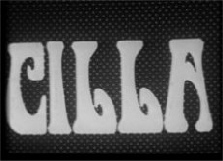
TV Pop Diaries
Pop Music on British Television 1955 -
One of the last tasks Cilla Black's manager Brian Epstein would tackle before his tragic death in August 1967 was to agree terms for Cilla's own primetime BBC1 TV series in the new year.
Cilla's working class personality had proved popular with the public and had made dozens of TV appearances since her debut in September 1963, but only had a couple of specials to her name, Thank Your Lucky Stars Presents Cilla Black in January 1965 and Rediffusion's Cilla at The Savoy in July 1966. Seeing that Tom Jones, Dusty Springfield and other star singers had been given their own series it was inevitable that she would be offered a chance to host her own show. After Epstein's death Bernard Lee from NEMS would complete negotiations with the BBC's Bill Cotton Jnr.
The BBC1 shows hosted by singers tended to fall into two camps, Dusty, Sandie and
Scott who made sure that the music would be forefront and wouldn't invite potentially
incompatible guests, and the Lulu, Cliff camp which would have dancers, comedy sketches
and features like the A Song For Europe qualifier. The Cilla show would very definitely
fall into the second camp. Talking to Disc before the first show the BBC's Bill Cotton
Jr said "I'm sure Cilla will prove she's an all-
Paul McCartney wrote her theme tune 'Step Inside Love' which would last until the
early seventies, while fellow Beatle Ringo would star in the second show, increasing
the show's audience that week by two million to thirteen million. Guest Cliff Richard
performed the six short-
Initially announced at The Cilla Black Show, the show would follow pretty much the same course as any variety show before or after, but interviewing members of the public on the street would prove one of the more popular aspects and would later be copied by Esther Rantzen on That's Life in the seventies.
The first series was broadcast on a Tuesday evening at 8.00 pm replacing This Is Petula Clark. Several shows featured Frankie Howerd with sketches written by Eric Sykes and Galton & Simpson.
The final show of the series proved memorable as she couldn't stop herself from bursting
into tears on the final number, the show's theme. Talking to Melody Maker, a BBC
spokesman said "We had thousands of letters asking for Cilla to come back. Some of
them have been heart-
The second series would be broadcast Wednesday's and would now include a regular spot featuring birthday and anniversary requests, while the third series starting November 1969 sees the show moved back to Tuesday.
1970 would prove awkward for the singer as despite winning the Top Female Personality in The Sun Television Awards 1970 she didn't have a series that year to back it up with. However she did get to host the annual Christmas Night with the Stars extravaganza.
She was back in January 1971 with a new season of shows, this time on a Saturday
night and by the time of the next series starting in November the format was perfect.
A new theme tune Something Tells Me was used but would become her last hit single.
Five of the shows were broadcast live as to accommodate a new gimmick. A camera team
was sent off to a secret location, a street somewhere in Britain, which would then
be revealed live on her show with people peeking out of their doorways only to find
themselves on telly, pre-
'Cilla' went missing from the schedules in 1972 finally turning up on the 30th December
with one new show, and a new feature where members of the public would realise their
unusual ambitions, something that would re-
The show returned in January 1974, but her chart career was far behind her and to make things worse the Song For Europe spot would be given to another show. The series would finish on 2nd March 1974, just before the birth of her baby, and bar a couple of bank holiday specials it looked like the end.
She made no appearances at all for the BBC in 1975 turning instead to ATV who gave her, perhaps unwisely, a series of six comedy shows 'Cilla's Comedy Six'. The aim was to probably turn one of them into a series at a later date like Ronnie Barker had done, but none of the shows were popular so the idea was dropped and she returned to the BBC the following year.
The first show in February was notable as her live camera crew turned up to surprise a member of the public only to find that they had gone out for the evening. The idea was dropped a few weeks later and the show came to an end 17th April 1976.
Cilla gave comedy acting another go with Cilla's World Of Comedy, but like the previous adventure it was not a success.
For the next few years she would appear in Cadbury's chocolate commercials and be
a guest on other people's shows. It wouldn't be until the mid-
How would you like to appear on TV? If you have a birthday or anniversary on Wednesday, January 29, write to: Cilla, BBC Television, London, W.12.
CILLA
BBC1
30th January 1968 -
